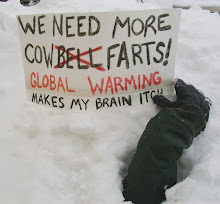Well, that sounds horrifying. It sounds too terrible to be true, in this day and age. Come to think of it, it sounds like another crisis...
Since I no longer trust my government when it tells me there's a crisis, I thought I'd try to learn a little more than what I was getting from the media.
First, it turns out that "USDA does not have a measure of hunger or the number of hungry people." Hmmmm... Well, what do they measure then? They're measuring "food insecurity". Here's the difference, as per the USDA's own report: "Food insecurity—the condition assessed in the food security survey and represented in the statistics in this report—is a household-level economic and social condition of limited or uncertain access to adequate food. Hunger is an individual-level physiological condition that may result from food insecurity."
MAY RESULT. Got that? It means not everybody who answered "yes" to the questions is starving. Or even necessarily hungry.
Yet WaPo reports: "The magnitude of the increase in food shortages -- and, in some cases, outright hunger -- identified in the report startled even the nation's leading anti-poverty advocates..."
Except the report doesn't mention hunger, except to define it and explain that it isn't measured.
CNN Money says: "The one-year jump is all the more significant, given the number of hungry Americans had never been higher than 11.9% since these surveys began."
There's that "hunger" thing again.
And HuffPo blogger David Becker says: "Put another way, 4 million more households went hungry in 2008, or the equivalent of every man, woman and child living in New York City."
Again, nowhere in the report did I read this. It is simply NOT there. Appendix B of the report does, however, address bluntly the fact that hunger is not measured - and why: "The word “hunger,”the panel stated in its final report, “...should refer to a potential consequence of food insecurity that, because of prolonged, involuntary lack of food,results in discomfort, illness, weakness, or pain that goes beyond the usual uneasy sensation.” To measure hunger in this sense would require collection of more detailed and extensive information on physiological experiences of individual household members than could be accomplished effectively in the context of the CPS-FSS."
But maybe I'm harping on a technicality? Maybe the "hunger" and "insecurity" are more interchangeable than I'm allowing for?
Then, I saw this at Patterico... "Very few of these people are hungry,” said Robert Rector, an analyst at the conservative Heritage Foundation. “When they lose jobs, they constrain the kind of food they buy. That is regrettable, but it’s a far cry from a hunger crisis.”
I went to Heritage.org to learn more. I found an article by the same Robert Rector, discussing "Hunger Hysteria". There's some pretty interesting info there that is NOT being used to tone down the current headlines. Specifically:
"What is rarely discussed is that the government's own data show that the
overwhelming majority of food insecure adults are, like most adult Americans,
overweight or obese. Among adult males experiencing food insecurity, fully 70
percent are overweight or obese.[9] Nearly three-quarters of adult women
experiencing food insecurity are either overweight or obese, and nearly half (45
percent) are obese. Virtually no food insecure adults are underweight."
So... Single-female heads of household were among those who were most "food insecure", but they're also the fattest? How does that work?
"Thus, the government's own data show that, even though they may have brief
episodes of reduced food intake, most adults in food insecure households
actually consume too much, not too little, food."
Makes sense... a lot more sense than the idea that one of the fattest nations on the planet is actually starving. So where's the problem? How can they have less than enough food, and be fat?
"... one common misconception is that poor people become obese because they are
forced, due to a lack of financial resources, to eat too many junk foods that
are high in fat and added sugar."
Ahhhh. We're back to that. I'm poor, so I can't buy good food. What a load. I've said it before, it costs a LOT less to buy a head of lettuce and a bag of carrots than it does to buy a case of soda and a bag of Doritos. And water is the cheapest beverage on the shelves (as long as you aren't purchasing designer brands).
I have more politically incorrect questions... How many of these folks who are afraid they'll run out of food have a cell phone? Video games? Cable TV? Acrylic fingernails? Are they buying cases of soda and bags of chips with money they should be spending on something nutritious?
Yeah. I know. I'm not supposed to go there. Why should we factor in personal responsibility? We're not supposed to suggest that there are items in life that a person can survive without if their children need food. Well, it's about time someone did.
It would be a tragedy if we had these numbers of people actually going to bed hungry. In a country as great as I consider America to be, it would be absolutely criminal to allow such deprivation. Our strength should be measured by how we treat our weakest, and how we answer
the call to fill our citizens' most basic needs - including hunger, where it actually exists.
This report, and the spin on it, leaves me feeling manipulated. Once again, our government and the media are leaving out important information in an attempt to portray a crisis where perhaps there isn't one. If they can convince us the fattest people in the country are actually the hungriest, what's next? The best healthcare system in the world doesn't work?
Oh... wait...


No comments:
Post a Comment